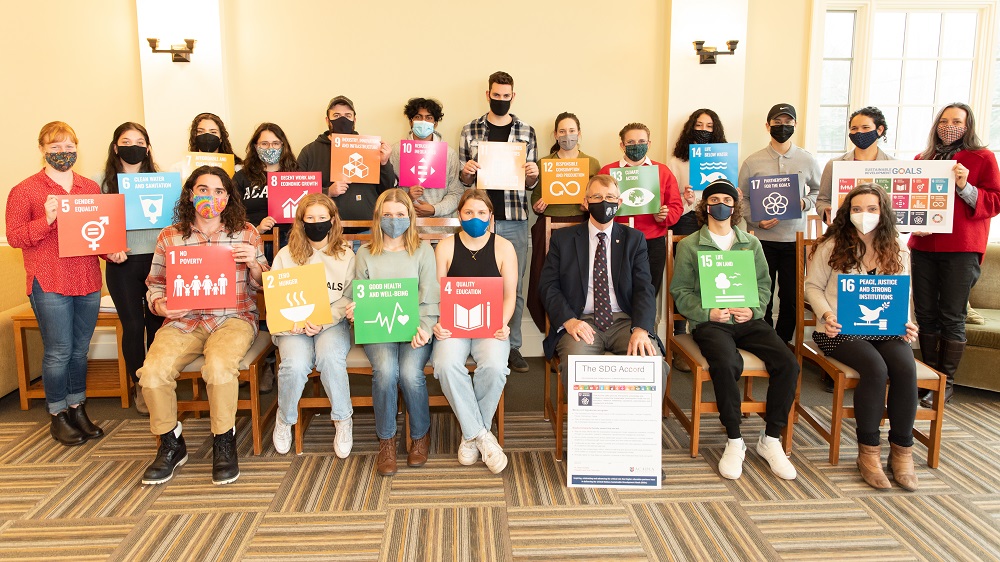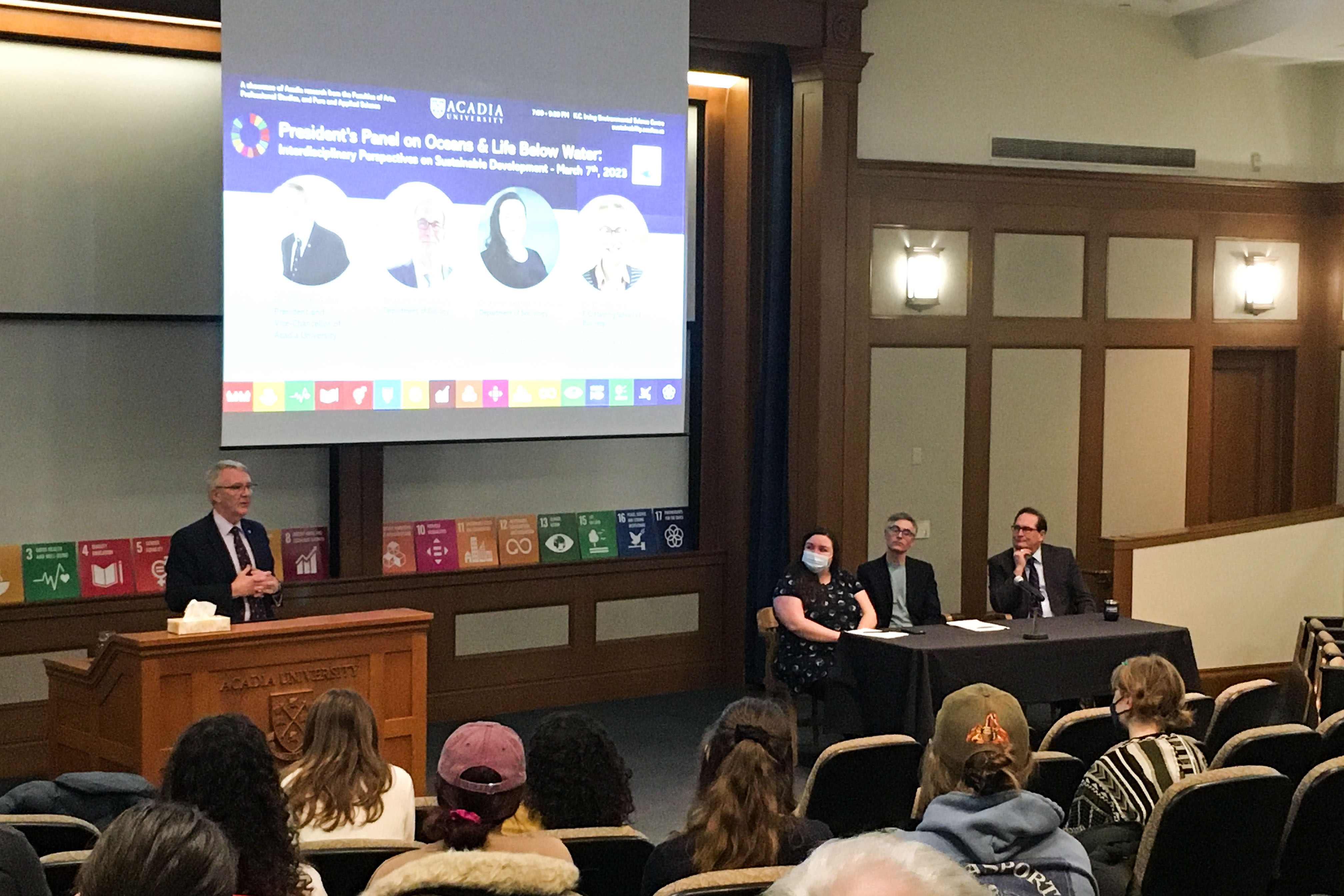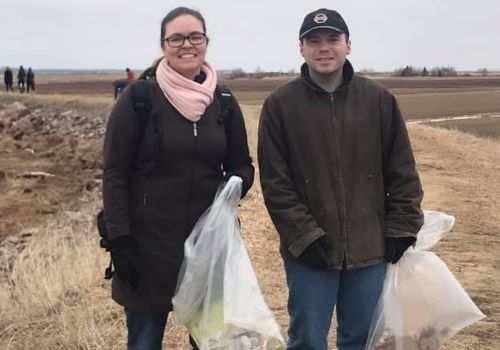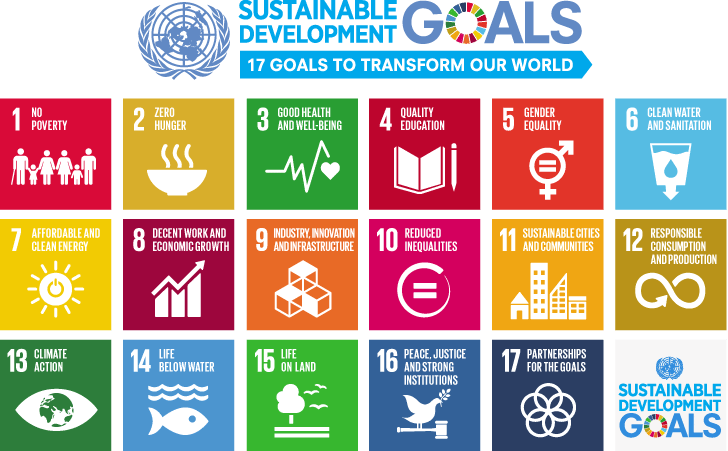United Nations Sustainable Development Goals
In 2015 the United Nations Member States adopted 17 ambitious goals as part of the 2030 Agenda for Sustainable Development. The UN Sustainable Development Goals Framework set out a 15-year plan to achieve the goals, which are the blueprint to achieve a better and more sustainable future for all. They address the global challenges we face, including poverty, inequality, climate change, environmental degradation, peace and justice.
Acadia Strategic Plan
In 2019 the Acadia Strategic Plan, Acadia 2025: Transforming Lives for a Transforming World, signaled the University's intention to align our activities with the UN SDG goals. Specifically, the plan states that Acadia will:
Align with applicable UN Sustainability Development Goals (SDGs) as guiding principles for Acadia’s development and adopt an appropriate Sustainability Performance Index.
Acadia works collaboratively with the ASU, the Town of Wolfville, and other partners to align our activities and advance the SDG Goals that Acadia is best positioned to impact locally, and globally.
SDG Accord

Dr. Peter Ricketts, Acadia University President and Vice-Chancellor, signed the SDG Accord on behalf of the institution on November 24th, 2021 at an event organized in partnership with students in Environmental and Sustainability Studies. In doing so, Acadia became the first university in Canada to sign the Accord. The commitment requires Acadia to align campus activities with the UNSDGs, collaborate with other signatories and report on progress.
President's Panel on Sustainable Development

Each year Acadia chooses a single SDG to focus on for campus education, engagement and operations activities. The highlight of the annual program is the President's Panel on Sustainable Development, which is a showcase of Acadia research, teaching, and service featuring presenters from the Faculty of Arts, Professional Studies and Pure & Applied Science.
2022/2023 President's Panel on Oceans & Life Below Water. - March 7th, 2023
2023/2024 President's Panel on Zero Hunger (SDG#2) - November 27th, 2023
2024/2025 President's Panel on Climate Action (SDG #13) - November 28, 2024
2025/2026 President's Panel on Decent Work and Economic Growth (SDG#8) - March XX, 2026 (TBD)
Sustainable Development Solutions Network (SDSN)
The Sustainable Development Solutions Network (SDSN) (SDSN) was established in 2012 under the auspices of the UN Secretary-General. It mobilizes global scientific and technological expertise to promote practical solutions for sustainable development, including the implementation of the Sustainable Development Goals (SDGs) and the Paris Climate Agreement. SDSN works closely with United Nations agencies, multilateral financing institutions, the private sector, and civil society. Acadia University is a member of the Network. Member contacts are Jodie Noiles, Acadia Sustainability Coordinator and Dr. Glyn Bissix from the Department of Community Development.
SDSN Youth Network
Acadia is also a member of SDSN Youth Global Network. The youth focused program educates young people about the Sustainable Development Goals and provides opportunities for them to pioneer innovative solutions to address the world's biggest challenges.
Acadia SDG Student Club

SDG Club Dyke Spring Clean-up. Photo by Kaitlyn McLay.
Acadia students established an SDG club in 2019 dedicated to helping achieve the Sustainable Development Goals by 2030.
Applied SDG Learning
Service learning initiatives create opportunities for Acadia students to meet learning outcomes in the classroom and operational outcomes on campus or in the community. Applied projects focused on the SDGs contribute to meaningful change.
Students in CODE 3013: Community Design, Wellness and Active Living taught by Dr. Glyn Bissix from Community Development, explored wellness and active living in the context of the COVID-19 pandemic, the social determinants of health, and the UN’s sustainable development goals (SDGs). They produced a report for a local community.
Students in ESST 4003: Sustainability Projects, taught by Dr. Alice Cohen from Environmental and Sustainability Studies, worked with the Acadia Sustainability Office to explore ways to integrate the SDGs in campus activities. Their work involved a review of current research, teaching and operational activities, and making recommendations for new initiatives that build on existing capacities as well as addressing gaps.
Students in CODE 3023: Program Design, taught by Chaiti Seth from Community Development, organized an SDG Fair featuring educational activities and a clothing swap in partnership with the Acadia Sustainability Office for SDG Month.

